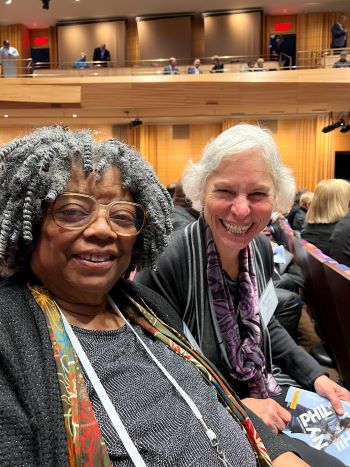“I am sick and tired of being sick and tired, and we want change.” – Fannie Lou Hamer, December 20, 1964
With our next presidential election less than two months away, White Snake Projects, an activist opera company in Boston, is offering a powerful reminder of the intense struggle over voting rights in the U.S. sixty years ago. They are presenting Is This America? an opera by Mary D. Watkins about the beloved voting rights activist, Fannie Lou Hamer. There will be three performances at the Strand Theatre in Boston on September 20, 21 and 22. For more information and tickets, please visit the White Snake Projects website>>
About the Opera
The opera tells the story of Fannie Lou Hamer (1917 – 1977), who was one of the first African-Americans to try to register to vote in Mississippi in 1962. She led efforts to mobilize African-American voters, and she endured beatings, harassment, death threats, and imprisonment in order to secure voting rights for her people.
The title of the opera is taken from an iconic speech Hamer gave in 1964, when she was trying to persuade the organizers of that year’s Democratic National Convention to recognize a mixed-race delegation from Mississippi, instead of the usual all-white one.
In a nationally televised speech, she gave details about how she other voting rights activists were being terrorized and how she had been brutally beaten by the police. At the end of her speech she asked:
“Is this America, the land of the free and the home of the brave, where we have to sleep with our telephones off the hooks because our lives are threatened daily because we want to live as decent human beings in America?”
Although her delegation was not seated in 1964, her passionate address combined with nationwide protests by other Black activists had a deep impact on public attitudes. Just one year later, President Lyndon B. Johnson signed the Voting Rights Act of 1965, which outlawed discriminatory voting practices.
About Mary D. Watkins
WomenArts is especially proud of the success of Mary D. Watkins because we have been working closely with her for over a decade on her operas and other musical projects. Watkins is 84 and she is living proof that artists can be immensely productive in their later years. She didn’t start writing operas until she was in her late 60s, and she has now composed four full-length operas on historical themes, as well as two short ones. She is also active as an orchestral composer, and her works have been played by some of the finest orchestras in the world.

Watkins wrote the first version of this opera in 2009, the year that Obama was sworn in as President. She wanted to tell Fannie Lou Hamer’s story, because Hamer was a powerful and important woman leader who was not as well-known as some of the male figures in the civil rights movement.
Watkins was in her 20’s when Fannie Lou Hamer and others were working to obtain the Voting Rights Act of 1965. Over the course of her lifetime, Watkins has seen the political changes that have happened because of the hard work and sacrifices of those activists. The Voting Rights Act made it possible for many more people – especially African-Americans – to register and vote, and those votes have helped elect many legislators of color in the U.S., including President Obama.
The first version of this opera, known as Dark River: The Fannie Lou Hamer Story, was presented by the Oakland Opera Theater in 2009, conducted by Deirdre McClure and directed by Darryl V. Jones. Then WomenArts raised the funds for a staged workshop of Dark River at Mount Holyoke College in 2014 conducted by Tianhui Ng, and a concert version at Agnes Scott College in Atlanta in 2016, conducted by Qiao Chen Solomon.
In 2020 Watkins collaborated with WomenArts President Martha Richards to obtain an Opera America Grant for Women Composers: Discovery Grant, supported by the Virginia B. Toulmin Foundation. WomenArts was originally planning to do another workshop, since it is very expensive to do a full production, but fortunately White Snake Projects’ Artistic Director, Cerise Lim Jacobs, decided to do a fully-staged, professional production and she has completely transformed the show.
Jacobs did dramaturgical work to give the opera a more manageable cast size and length; she made contributions to the libretto; and she changed the name to Is This America? She also took on the daunting task of raising the necessary funding and has done an incredible job. She has obtained grants from the Mellon Foundation, the National Endowment for the Arts, the Mass Cultural Council, the Boston Cultural Council, Eastern Bank, the Mayor’s Office of Arts and Culture, the Alice M. Ditson Fund, Boston Planning and Development Agency, and Samuel Adams Brewery.
Remember to Vote!
In 2013, the U.S. Supreme Court ruled that some of the enforcement provisions of the Voting Rights Act of 1965 were unconstitutional. Since then many states have tried to bring back discriminatory voting laws in an effort to control the results of our upcoming elections.
As the opera makes clear, people fought and died for your right to vote. If you are eligible to vote, please be sure to cast your ballot!
If you haven’t registered yet or need more information about voting, White Snake Projects has created a page of Voting Resources.
Get Tickets to “Is This America?“
What: Is This America? An opera by Mary D. Watkins with dramaturgy and additional libretto by Cerise Lim Jacobs.
Produced by: White Snake Projects
Where: Strand Theatre, 543 Columbia Road, Boston, MA 02125
When: Friday, September 20 at 8 p.m.; Saturday, September 21 at 7:30 p.m.; and Sunday, September 22 at 2 p.m.
Prices: Tickets are $25 – $185. Seats are available for all performances.
More Info & Tickets: https://www.whitesnakeprojects.org/projects/is-this-america.



